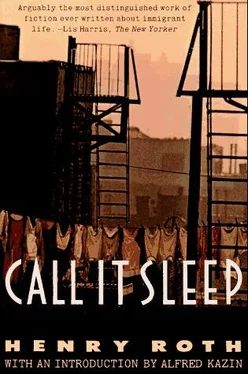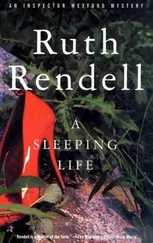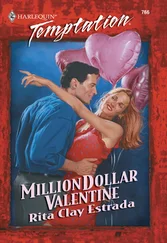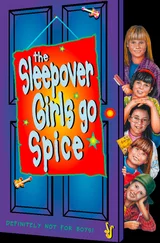Uphill, the faint slope, steep to aching legs, he ran, avoiding the careless glance of the few who noticed. Tenth Street. A street car crossed the Avenue, going west. The river wind blew straight and salt between a flume of houses. He swung sharply into it, entered the river-block, dimlit, vacant. Ahead of him, like a barrier, the one beer-saloon, swinging door clamped in a vise of light, the mottled stained-glass window bulging with a shoddy glow.
— Somebody’ll see.
He skulked in the shadows against the rough wall of the iron-works, crept forward. In the ebb of river-wind, the faint bitter flat beer spread round him. Gone in the quick neaping of wind — A man knuckles to mustache, flung back the swing-door — whirred reiteration of bar and mirror, bottles, figures, aprons — David slunk past him into deeper shadow.
And now the old wagon-yard, the lifted thicket of tongues; the empty stables, splintered runways, chalked doors, the broken windows holding still their glass like fangs in the sash, exhaling manure-damp, rank. The last street lamp droning in a cyst of light. The gloomy, massive warehouse, and beyond it, the strewn chaos of the dump heap stretching to the river. He stopped. And where a shadowy cove sank between warehouse wall and dump heap, retreated.
— Yuh dared me … Yuh double-dared me … Now I gotta.
The tracks lay before him — not in double rows now but in a single yoke. For where he stood was just beyond the fork of the switch, and the last glitter on the tines lapsed into rust and rust into cobbles and cobbles merged with the shadowy dock and the river.
— Scared! Scared! Scared! Don’t look!
He plucked his gaze away, tossed frenzied eyes about him. To the left, the chipped brick wall of the warehouse shut off the west and humanity, to the right and behind him, the ledge of the dump heap rose; before him land’s end and the glitter on the rails.
— Yuh dared me … Yuh double-dared me … Now I gotta. I gotta make it come out.
The small sputter of words in his brain seemed no longer his own, no longer cramped by skull, but detached from him, the core of his surroundings. And he heard them again as though all space had compelled them and were shattered in the framing, and they boomed in his ears, vast, delayed and alien.
— Double-dared me! Now I gotta! Double-dared me! Now I gotta make it come out.
XXI
INSIDE the Royal Warehouse, located on the East River and Tenth Street, Bill Whitney, an old man with a massive body, short-wind and stiff, rheumatic legs, toiled up the stairway to the first floor. In his left hand, he held a lantern, which in his absent-mindedness, he jogged from time to time to hear the gurgle of its fuel. In his right hand, clacking on the bannister at each upward reach of his arm, he held a key — the key he turned the clocks with on every floor of the building — the proof of his watch and wakefulness. As he climbed the swart stairs, stained with every upward step by shallow, rocking lantern-light, he muttered, and this he did not so much to populate the silence with ephemeral, figment selves, but to follow the links of his own slow thinking, which when he failed to hear, he lost:
“And wut? Haw! Ye looked down — and — sss! By Gawd if there waren’t the dirt-rud under ye. And. Ha! Ha! Haw! No wheels. Them pedals were there — now waren’t they? Saw ’em as clear — as clear — but the wheels gone — nowhere. By Gawd, thinks I— Now by Gawst, ain’t it queer? Old Ruf Gilman a’standin’ there, a’standin’ and a’gappin’. Jest a’standin’ and a’gappin’ as plain— And the whiskers he growed afore the winter … By the well with the white housing. A’savin’ his terbaccer juice till he had nigh a cupful … Whawmmmmm! Went plumb through the snaw in the winter…”
Resounded, surged and resounded, like
ever swelling breakers:
— Double! Double! Double dared me!
Where there’s light in the crack,
yuh dared me. Now I gotta.
In the blue, smoky light of Callahan’s beer-saloon, Callahan, the pale fattish bar-keep jammed the dripping beer-tap closed and leaned over the bar and snickered. Husky O’Toole — he, the broad-shouldered one with the sky-blue eyes — dominated those before the bar (among them, a hunchback on crutches with a surly crimp to his mouth, and a weazened coal-heaver with a sooty face and bright eye-balls) and dwarfed them. While he spoke they had listened, grinning avidly. Now he threw down the last finger of whiskey, nodded to the bar-tender, thinned his thin lips and looked about.
“Priddy wise mug!” Callahan prompted filling his glass.
“Well.” O’Toole puffed out his chest. “He comes up fer air, see? He’s troo. Now, I says, now I’ll tell yuh sompt’n about cunt— He’s still stannin’ be de fawge, see, wit’ his wrench in his han’. An I says, yuh like udder t’ings, dontcha? Waddayuh mean, he says. Well, I says, yuh got religion, aintcha? Yea, he says. An’ I says, yuh play de ponies, dontcha? Yea, he says. An’ yuh like yer booze, dontcha? Sure, he says. Well I says, none o’ dem fer me! Waddayuh mean, he says. Well, I says, yuh c’n keep yer religion, I says. Shit on de pope, I says— I wuz jis’ makin’ it hot — an’ t’hell witcher ponies I says— I bets on a good one sometimes, but I wuzn’ tellin’ him — an’ w’en it comes t’ booze I says, shove it up yer ass! Cunt fer me, ev’ytime I says. See, ev’ytime!”
They guffawed. “Yer a card!” said the coal heaver. “Yer a good lad!—”
As though he had struck the enormous bell
of the very heart of silence, he
stared round in horror.
“Gaw blimy, mate!” Jim Haig, oiler on the British tramp Eastern Greyhound, (now opposite the Cherry Street pier) leaned over the port rail to spit. “I ain’t ’ed any fish ’n’ chips since the day I left ’ome. W’y ain’t a critter thought of openin’ a ’omely place in New York — Coney Island fer instance. Loads o’ prawfit. Taik a big cod now—”
Now! Now I gotta. In the crack,
remember. In the crack be born.
“Harrh! There’s nights I’d take my bible-oath, these stairs uz higher.” On the first floor, Bill Whitney stopped, gazed out of the window that faced the East River. “Stinkin’ heap out there!” And lifting eyes above the stove-in enameled pots, cracked washtubs, urinals that glimmered in the black snarl, stared at the dark river striped by the gliding lights of a boat, shifted his gaze to the farther shore where scattered, lighted windows in factories, mills were caught like sparks in blocks of soot, and moved his eyes again to the south-east, to the beaded bridge. Over momentary, purple blossoms, down the soft incline, the far train slid like a trickle of gold. Behind and before, sparse auto headlights, belated or heralding dew on the bough of the night. “And George a’gappin’ and me a’hollerin’ and a’techin the ground with the toe of my boot and no wheels under me. Ha! Ha! Mmm! Wut cain’t a man dream of in his sleep … A wheel … A bike…” He turned away seeking the clock. “And I ain’t been on one … not sence … more’n thirty-five … forty years. Not since I uz a little shaver…”
Clammy fingers traced the sharp edge of
the dipper’s scoop. Before his eyes
the glitter on the car tracks whisked …
reversed … whisked …
“Say, listen O’Toole dere’s a couple o’ coozies in de back.” The bar-keep pointed with the beer knife. “Jist yer speed!”
“Balls!” Terse O’Toole retorted. “Wudjah tink I jist took de bull-durham sack off me pecker fer — nuttin’? I twisted all de pipes I wanna w’en I’m pissin’!”
Читать дальше












